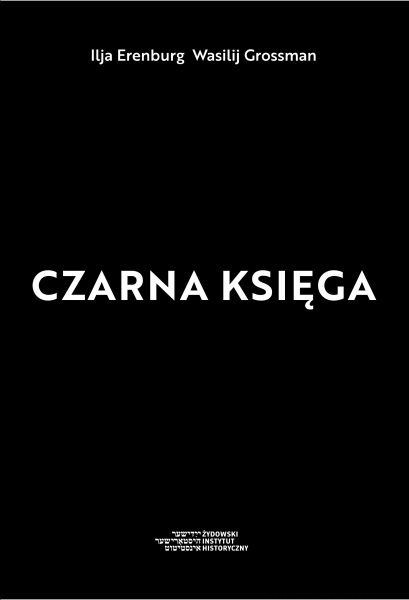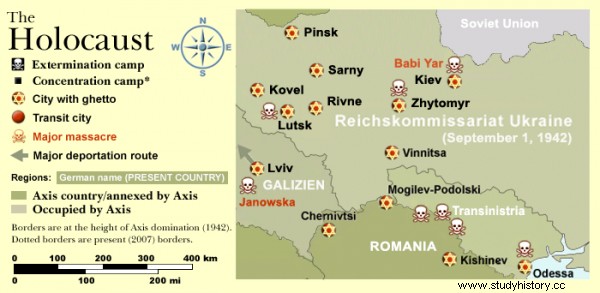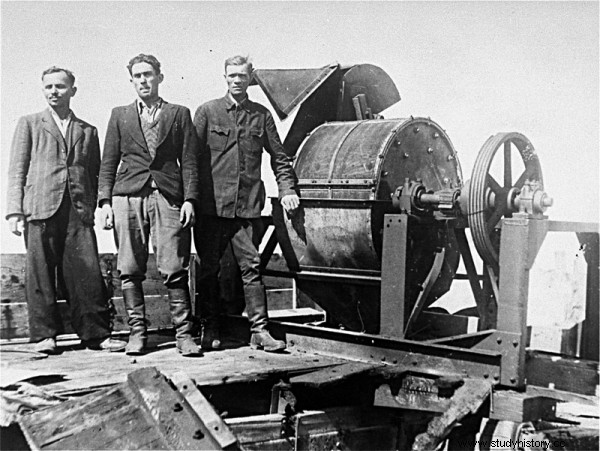German troops entered Kiev on September 19, 1941. That day, at one o'clock in the afternoon on Bessarabka, the Germans burst into shops and plundered them. The caretakers did not let the residents out of the courtyards. Here, too, in Bessarabka, several Jews were arrested. They were beaten to blood and transported in a large truck.
Nesia Elgort returned home from Bessarabka (ul. Saksagańskiego 40) and found her entire huge family together. The old woman, grandmother Dina Szmulewna, looked at all her children and as if wanting to make them inaccessible to enemies, said:
- My God, where are we all going to be?
On September 21, the head of the family, Berl Hercowicz, with Nesa's sister Roza went to Stalinka to check his apartment. In the evening, Roza returned and told that my father had been taken by the Germans, where - it is not known. Nesia decided to go look for her father in the morning.

The article is an excerpt from the book Black Book , which is the first Polish edition of one of the earliest documents on the extermination of Jews within the USSR.
She didn't know where to go. Together with her son Ilyusha, she went to the commandant. He asked one thing - what nationality he belongs to. Upon learning that she was Jewish, he drove her out of the room.In Lenin Street, she saw the Germans beating men - Jews, on the legs, making them dance. Then the Germans forced the tortured people to load heavy boxes onto the car. People fell under the load beyond their strength. The Germans beat them with rubber truncheons.
On September 22, the people of Kiev were awakened by a powerful explosion. From the side of Khreschatyk there was a smell of smoke and burning.
Life in Kiev was getting unbearable
The Germans rushed people from the streets adjacent to Chreschatyk to the fire. A German ran past the house on Saksagański Street, where Nesia Elgort stood. He looked at her and, pointing his arm around her neck and then towards the explosions, shouted out:
- Partisan, Jude, kaputt!
On the same day, a newspaper in Ukrainian appeared on the outer walls of the houses. It said that Jews, communists, commissars and partisans would be liquidated. Two hundred rubles were promised for each partisan or communist issued. Such newspapers were hung both on Krasnoarmiejska and on other streets of the city.

Map of the Holocaust in Ukraine
Life in Kiev was becoming more and more unbearable. The Germans were breaking into houses, chasing people, taking them somewhere, and these people never came back. The Elgort family moved from the apartment to the basement. Nesia had to get food - she didn't look Jewish. The Elgort family lived in the basement for several days. The caretaker, Paweł Dawydczenko, who knew about the family's whereabouts, spoke to Nesia when she was going to fetch water:
- Why are you hiding there, you will be evicted from Kiev anyway.
Meanwhile, he himself, in agreement with the Germans, plundered the apartments in the house entrusted to him.
Caught and tormented
Once, on a journey to find her mother-in-law, Gitl Elgort, who went to check her apartment on Żylańska Street, Nesia unexpectedly met her father. His appearance terrified her. It turned out that together with a group of Jews, including a rabbi, he was caught by the Germans and thrown into a damp basement, where they were mistreated. Several people were martyred, and he, Nesia's father, and the rabbi miraculously survived. Tears ran down the old man's gaunt cheeks.
On September 22, mass torture of Jews took place on the city streets, near street fire hydrants and in orchards.
Many residents of Kiev, especially the districts of Padół and Słobódka, saw swollen bodies of tortured old people and children floating on the Dnieper on the second and third days of German rule. On Friday, September 26 and Saturday, September 27, the Jews who went to the synagogue did not return home. A Kiev citizen, Yevgeny Litoshchenko, testifies that her neighbors, the old man Sznejder and Rozenblat with his wife, did not return home from the synagogue. She saw their dead bodies in the Dnieper. The same is confirmed by ob. T. Michasiewa. The synagogues were surrounded by German machine gunners and policemen. In several places near Kiev, the waves of the Dnieper washed sacks with prayer equipment ashore.
Upon seeing the brunet, the Gestapo agents and Ukrainian police agents demanded proof of identity. Jews were tortured, led to the police or the Gestapo. They were shot at night.
On the fifth day after the Germans entered Kiev, W. Liberman, taking advantage of the fact that the registration book had been burned and a new house manager had been appointed, decided to impersonate Karaim and change his name - Liberman to Libermanow.
"Notify the Gestapo!"
On September 24, he left the house and, crossing Korolenki Street, turned onto Tolstoy Square. He was approached by a tall man in a kepi and a black overcoat. He ordered him to stop and demanded proof of identity. Liberman refused to show the identity card to the stranger. He had no ID with him:he hid it at home. "I am an agent of the Ukrainian political police, please show your proof," said the man irritably. "I suspect you are a Jew." Liberman replied, "I am a Karaim, my ID has been stolen." The police agent told him to follow him.
As Liberman was walking along the Khreschatyk, he saw a car with a huge megaphone driving down the street, often stopping, and someone shouting in a booming voice:“Inform the Gestapo and the police of the whereabouts of communists, partisans and Jews. Notify! ”.

Members of the so-called Sonderkommando 1005 in the Janowski Camp at the machine for grinding the bones of deceased people
A police agent brought Liberman to a cinema located in Khreschatyk, near Prorezna Street. One of the Gestapo men - a tall, wiry soldier - brutally punched him in the back and pushed him into the cinema's foyer. Liberman walked through the foyer into the hall. Over three hundred Jews sat in the room. Most of them were gray-bearded old men. They all sat in deep silence. Liberman sat down next to a young Jew and the latter whispered to him:"They will send us to work to Syrec and shoot us there at night".
Coming to the broken window of the cinema's foyer, Liberman watched the people passing by the Khreschatyk, with the secret hope that he would see his wife. He accidentally noticed a resident of the house where he lived passing by and called him. He quickly walked over to the window. Without explaining the reason for his arrest, Liberman asked him to tell his wife that he was detained and was in the cinema.
Soon, Liberman's wife, Valentina Bieriezew, approached the window. Taking advantage of the fact that there was no one in the foyer, Liberman said to her:“Walu, I claim to be Karaim. Take the signatures from Mikhailov, Goncharenko, Pasyczny, confirming that I am Karaim. Gestapo men are preparing a bloodbath for Jews ”.
Bieriezeva approached the Gestapo men and asked for her husband's release, saying that she, Valentina Bieriezew, was Russian, and he, her husband - Karaim. One of the Gestapo officers, failing to fully listen to the woman, pushed her with all his strength. She fell down the steps of the theater and hit her head hard on the pavement. She went home.
The death penalty
Liberman sensed that each hour that passed was bringing him and the Jews in the cinema closer to death. But chance saved him and all of them. At two o'clock in the afternoon of September 24, an explosion of enormous power broke out near the cinema. Liberman looked out of the broken window. Crazy, terrified people were running in a Christopher. A bloodied woman ran past, a man without an arm. Yellow, thick clouds of smoke lapped the Khreshchatyk. Shortly after the first outburst there was a second one. Twenty or thirty minutes had passed. The Gestapo men, shouting "Feuer" (fire), left their post at the entrance to the cinema and hid. The Jews, seeing that the Gestapo men ran out of the cinema, ran to their homes.
Upon arriving home, Liberman found out that his wife had burnt his ID, all documents, articles and photos of his parents. Liberman's friends - A.K. Mikhailov, D.Ł. Pasyczny, F I. Goncharenko - signed signatures confirming that he is a Karaim.

The article is an excerpt from the book Black Book , which is the first Polish edition of one of the earliest documents on the extermination of Jews within the USSR.
Liberman decided not to show up in the yard and on the street. His wife masked the entrance to the little kitchen and he sat there all day, like a prisoner, seeing a bit of blue sky from a narrow window.
In the evenings, the scarlet glare of a gigantic fire colored the sky. Set on fire, Khreschatyk burned for six days.
On September 27–28, 1941, a week after the Germans entered Kiev, an advertisement appeared on the walls of the houses in clear font, in Ukrainian and Russian, on thick blue paper:"The Jews of Kiev and the surrounding area! On Monday, September 29, at seven in the morning, you are to bring your belongings, money, documents, valuables and warm clothes to Dorogożycka Street, near the Jewish cemetery. For failure to appear - death penalty. For hiding Jews - the death penalty ” . There was no signature under this terrible order, which sentenced seventy thousand people to death.
The article is an excerpt from the book Black Book , which is the first Polish edition of one of the earliest documents on the extermination of Jews within the USSR
